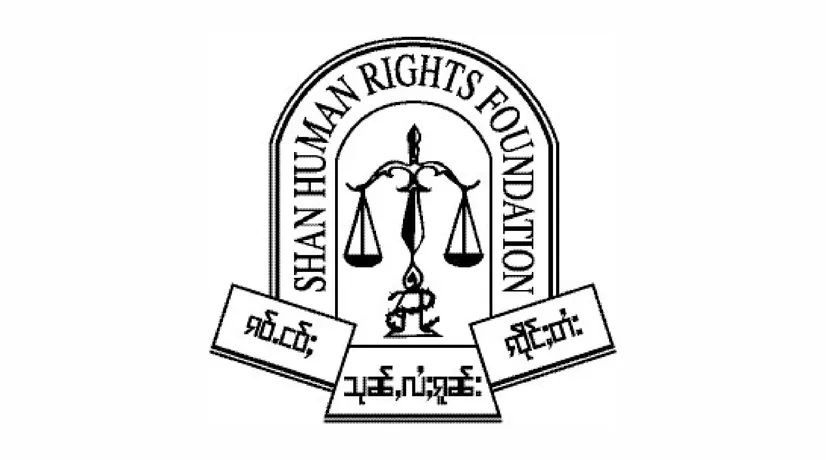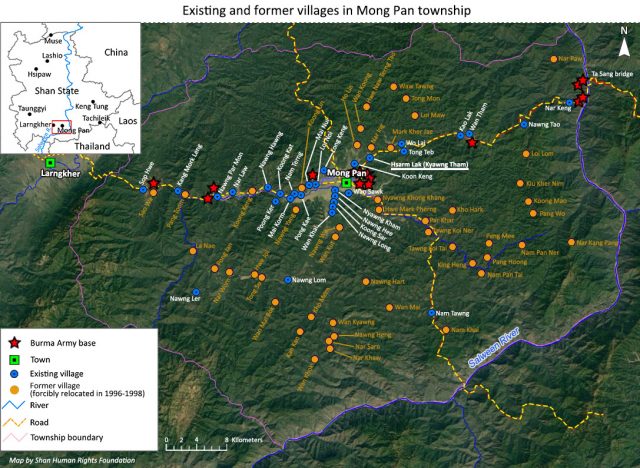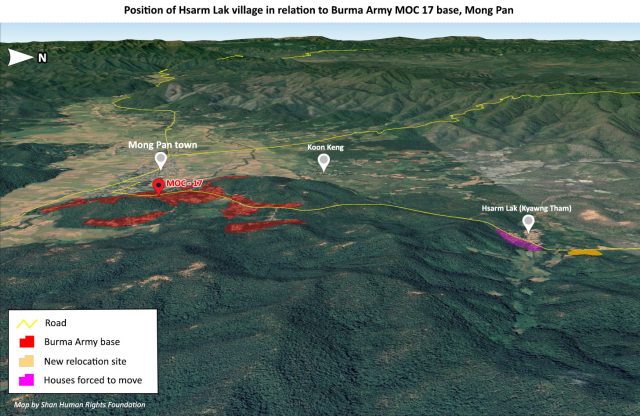Nightmare of forced relocation begins again for villagers in Mong Pan, southern Shan State
09 April 2021

Update by the Shan Human Rights Foundation
April 9, 2021
Nightmare of forced relocation begins again for villagers in Mong Pan, southern Shan State
On March 14, 2021, about 300 residents of Hsarm Lak village, Wo Lai village tract, Mong Pan township, Lang Khur district, southern Shan State were ordered to move out of their village by the Burma Army.
The order was given by Military Operations Command (MOC) 17 in Mong Pan, under the control of the Eastern Central Command in Kholam. The villagers were told that they were illegally living on military territory.
Hsarm Lak (also known as Kyawng Tham) is situated three miles east of Mong Pan town, along the main road leading to the Ta Hsang bridge over the Salween River. The entire southern half of the village, south of the road, comprising 45 houses, is being forced to move. 12 households are Burmese and the rest are Lisu.
Hsarm Lak village was set up in 2001 by eight Lisu families who had been forcibly relocated by the Burma Army from their original homes in Loi Loam village, Wo Lai tract, and Kho Hak village, Tawng Gwai tract in Mong Pan during the Burma Army’s mass forced relocation campaign in central and southern Shan State during 1996-1998. At that time, the entire rural population of Mong Pan – about 10,000 people from 61 villages — was forced from their homes into makeshift camps around the town, where nothing was provided for them. Those trying to return to their homes to forage for food were tortured and killed. In 1997 alone, SHRF documented extrajudicial killing of 37 villagers in Mong Pan, many of whom were beaten and tortured to death by Burma Army troops of LIB 331, 332 and 520. One old woman was burned alive in Wo Lai village.
The Lisu villagers spent several years in the relocation sites. In 2001, they were still not allowed to return to their original villages, but were ordered by the Burma Army to set up a new village by the side of the main road at Hsarm Lak.
This is now the third time the Lisu villagers are being forcibly relocated by the Burma Amy. The site to which they have been ordered to move is about ½ kilometer northeast of Hsarm Lak village, along the main road. They do not want to move there as the area is mountainous, with little available water, and the soil is poor.
When the Hsarm Lak villagers were given the relocation order on March 14, they were pressured to sign a written agreement that they would move, since the land belonged to the military. However, only 14 households signed the agreement. 31 households, all Lisu, did not sign.
On March 19, the Hsarm Lak villagers who had not signed were summoned to the MOC 17 base by Lieutenant General Myo Min Than, who pressured them again to sign, saying their village was on MOC 17 territory. He said his tenure at MOC 17 was five years. He had been there for two years already, and they had to move out before he left. The villagers still refused to sign.

MOC 17, which comprises 10 battalions, was set up in Mong Pan in 2000. Mong Pan is a key strategic location for the Burma Army, lying along the main southern Shan State transport route which crosses the Salween River at Ta Sang, linking to Mong Ton in eastern Shan State.
The MOC 17 base is strategically positioned on the hills east of Mong Pan town, overlooking the town and the main road. However, the base currently does not extend to the high hills behind Sarm Lak village. It appears that the relocation of Sarm Lak is linked to plans by MOC 17 is expand and fortify its base eastwards, to defend against potential attacks from that direction.
Tension between the Burma Army and the Restoration Council of Shan State/Shan State Army (RCSS/SSA), which operates in Mong Pan, has escalated sharply since the military coup on February 1.
The Burma Army’s mass forced relocation campaign in 1996-1998, which uprooted over 300,000 villagers in eleven townships in Shan State, was aimed at cutting off support for the newly formed RCSS/SSA.

Contact
Sai Hor Hseng +66: 94-728-6696 (Shan, English)
Sai Yord Leun +66: 97-173-1530 (Shan, Burmese)
Announcements
28 February 2025
Asian NGO Network on National Human Rights Institutions , CSO Working Group on Independent National Human Rights Institution (Burma/Myanmar)
Open letter: Removal of the membership of the dis-accredited Myanmar National Human Rights Commission from the Southeast Asia National Human Rights Institution Forum

Progressive Voice is a participatory rights-based policy research and advocacy organization rooted in civil society, that maintains strong networks and relationships with grassroots organizations and community-based organizations throughout Myanmar. It acts as a bridge to the international community and international policymakers by amplifying voices from the ground, and advocating for a rights-based policy narrative.